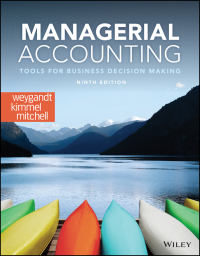Question
The D division of A-MART sells batteries. A-MART's corporate management gives the management of D division considerable operating and investment autonomy in running the division.
The D division of A-MART sells batteries. A-MART's corporate management gives the management of D division considerable operating and investment autonomy in running the division. A-MART is considering how it should compensate James Mak, the general manager of the D division:
(a)Proposal 1 calls for paying Mak a fixed salary.
(b)Proposal 2 calls for paying Mak no salary and compensate him only on the basis of the division's ROI, calculated based on operating income before any bonus payments.
(c)Proposal 3 calls for paying Mak some salary and some bonus based on ROI. Assume that Mak does not like bearing risk.
Required:
1.Evaluate the three proposals, specifying the pros and cons of each.
2.Suppose that A-MART competes against Texaco Industries in the battery business. Texaco is approximately the same size as the D division and operates in a business environment that is similar to D's. The top management of A-MART is considering evaluating Mak on the basis of D's ROI minus Texaco's ROI. Mak complains that this approach is unfair because the performance of another company, over which he has no control, is included in his performance-evaluation measure. Is his complaint valid? Why or why not?
3.Now suppose that Mak has no authority for making capital-investment decisions. Corporate management makes these decisions. Is ROI a good performance measure to use to evaluate Mak? Is ROI a good measure to evaluate the economic viability of the D division? Explain.
4.D's employees of sales department are responsible for selling and providing customer service and support. Sales are easy to measure. Although customer service is important to D in the long run, it has not yet implemented customer-service measures. Mak wants to compensate his sales force only on the basis of sales commissions paid for each unit of product sold. He cites two advantages to this plan:
(a)It creates strong incentives for the sales force to work hard, and
(b)The company pays sales department only when the company itself is earning revenues.
Do you like his plan? Why or why not?
Step by Step Solution
There are 3 Steps involved in it
Step: 1

Get Instant Access to Expert-Tailored Solutions
See step-by-step solutions with expert insights and AI powered tools for academic success
Step: 2

Step: 3

Ace Your Homework with AI
Get the answers you need in no time with our AI-driven, step-by-step assistance
Get Started


